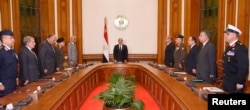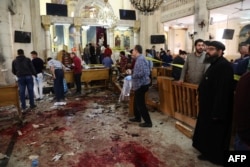Egypt has declared a declared a three-month state of emergency in the wake of two Coptic church bombings that killed at least 44 people.
"A series of steps will be taken, most importantly, the announcement of a state of emergency for three months after legal and constitution steps are taken," Egyptian President Abdel Fattah el-Sissi said in a speech aired on state television.
The first blast was in the northern city of Tanta, where a powerful explosion ripped through a Palm Sunday service at St. George's Church, killing 27 people and wounding 78 others, state TV reported. The explosive device was planted under a seat in the main prayer hall, it said.
Not long after that, at least 17 people were killed and 41 others wounded in a suicide bomb attack outside St. Mark's Coptic Orthodox Cathedral in Alexandria.
Islamic State claimed responsibility for the attacks.
U.S. President Donald Trump spoke on the phone Sunday with Sissi to offer condolences to the families who lost their loved ones.
In a White House statement, Trump called the attack "heinous."
"President Trump condemned the attacks that killed and injured dozens of Egyptians. The president also expressed his confidence in [the Egyptian president's] commitment to protect Christians and all Egyptians," the statement said.
Egypt's Christian minority, which makes up roughly 10 percent of the population, has increasingly been targeted by Islamist extremists.
Bishop Suriel, a Coptic Christian leader in Melbourne, Australia, told VOA that more needs to be done to increase security to protect Christians, as well as to combat terrorism that affects places all across the world.
He said attacks like the ones Sunday do not deter Coptic Christians.
"In fact, after such events we find that our churches are even more full and more people are coming to pray, and we raise their hearts to God for mercy and for strength," he said.
He also expressed hope that an upcoming visit to Egypt by Pope Francis, the leader of the Roman Catholic Church, will send a "very strong message of peace and hope."
Pope Francis denounced the bombings Sunday and expressed "his deep condolences" to Tawadros II and "all of the dear Egyptian nation." Pope Tawadros II, head of the Coptic Church, had been attending mass inside the targeted church in Alexandria but was not hurt, state media reported.
The United Nations Security Council called the attack cowardly and urged all members to assist the Egyptian government. Members said any form of terrorism "constitutes one of the most serious threats to international peace and security."
Meanwhile, Israel closed the Taba border that leads to the Sinai peninsula on Monday, amid warning by its anti-terrorism office of an "imminent" attack.
Yisrael Katz, Israel's transportation and intelligence minister, urged Israel citizens to leave Egypt. The minister said intel information shows "increased activity by the Islamic State militants" in Sinai, and because the terrorist group is losing ground in Syria and Iraq, there is a restored motivation to attack other areas.
The border remains open, Katz said, for those wanting to return to Egypt.
The announcement came hours before the beginning of the Passover holiday, a time where Sinai is a popular destination.
VOA's Victor Beattie contributed to this report.







